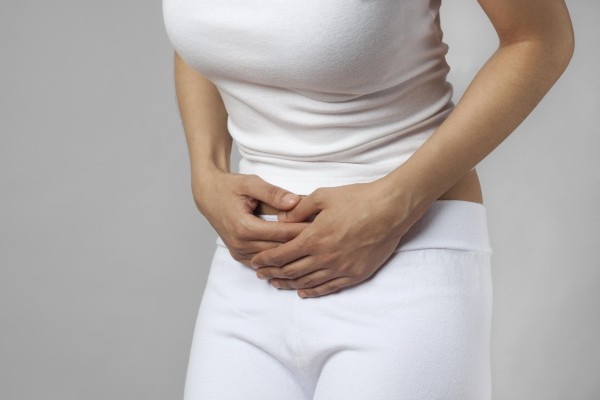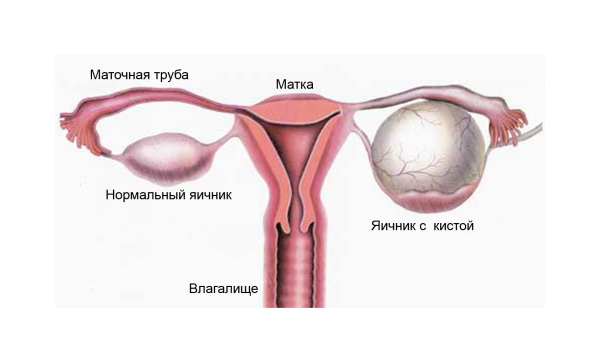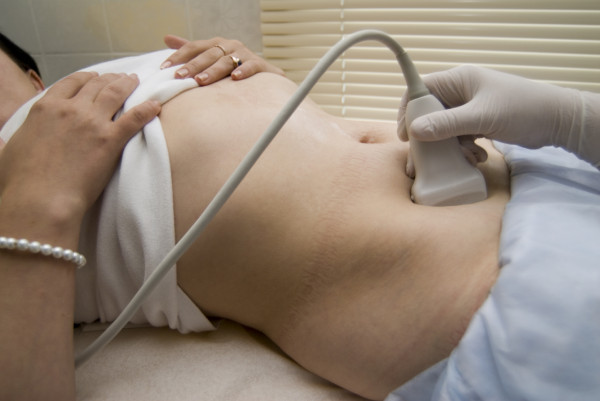Ovarian pain: what is the reason
Painful sensations in the ovaries occur periodically in most women. Often it is this discomfort that becomes the reason for a visit to the gynecologist. These unpleasant sensations are explained by various reasons.
Content
The cause of ovarian pain
Ovarian pain can be varied. It can be harsh or aching. Often occurs due to age, pregnancy, or a variety of diseases. Sometimes hormonal changes or diseases of other internal systems or organs become the cause of pain.
 The most common causes of pain are the following:
The most common causes of pain are the following:
- On the offensive menses in the early days, some women develop pain syndromes of a different nature. In fact, these pains appear in the uterus and not in the ovaries. They are formed with detachment of the inner layer of the uterus.
- There may be slight pain during ovulation. It lasts several hours and is manifested by a aching character. Usually appears on one side only.
- The feeling of pain in the ovaries can be the result of an infectious disease, the formation of a cyst, adhesions, tumors of a different nature.
- With the onset of early pregnancy, pain in the ovary can signal the formation of a cyst. With the development of pregnancy, painful feelings disappear.
Pain in the right ovary
The sensation of pain in the ovary on the right side can occur under the influence of various factors. One of the possible causes is the inflammatory process or oophoritis. In this case, the pain is concentrated in the lower abdomen on the right, sometimes it is given to the sacrum or spine. In this case, the pain manifests itself in seizures, but in some cases it is also permanent. The pain intensifies during hypothermia, physical or emotional overwork, during a decrease in immune defenses.
 The second ailment that causes pain in the right ovary is adnexitis. It is called most often chlamydia, candida, and other microorganisms. If nothing is done to treat this disease, infertility can occur. The pain in this variant is paroxysmal and is localized in the right lower abdomen. Pain in the sacrum or lower back may also be felt.
The second ailment that causes pain in the right ovary is adnexitis. It is called most often chlamydia, candida, and other microorganisms. If nothing is done to treat this disease, infertility can occur. The pain in this variant is paroxysmal and is localized in the right lower abdomen. Pain in the sacrum or lower back may also be felt.
With the growth of a cyst or tumor in the right ovary, pain begins to be felt only with the achievement of a neoplasm of significant size. In this case, the neoplasm presses on other organs, which is why an unpleasant feeling appears. Sometimes the tumor can twist, causing tissue necrosis and inflammation.
If the integrity of the cyst membrane is violated, then its liquid contents are poured into the abdominal cavity, which provokes tissue irritation. In this case, peritonitis occurs, requiring urgent surgical treatment.
Due to the high mobility of the ovaries in childhood, pain may appear. Stimulation of the onset of ovulation by medication leads to the same effect. In this case, the ovary increases in size and becomes painful. If the changes in the tissues of the ovaries have become irreversible, then the organ must be removed.
Pain in the left ovary
Since the ovaries are a paired organ of the female reproductive system, all processes occur in the right and left ovaries in the same way. Therefore, the reasons that cause an unpleasant feeling in the right ovary can be the cause of the same sensations on the left side. In this case, it is not at all necessary that the disease occurs simultaneously on both ovaries.
Ovarian pain during pregnancy
Most often during pregnancy pain in the ovarian region indicates the presence of a latent inflammatory disease. In this case, pregnancy simply became the impetus for the detection of an ailment.
Another possible cause of a painful feeling in the ovaries is too much stretching of the ligaments of the uterus as its size increases. In this case, the pain is felt simultaneously on both sides.
 Pain on the left or right in the ovary with signs of peritonitis is very dangerous. In this case, the abdomen becomes extremely painful and hard. It is impossible to feel it because of the pain. Often this condition indicates a torsion of the cyst or ovarian apoplexy.
Pain on the left or right in the ovary with signs of peritonitis is very dangerous. In this case, the abdomen becomes extremely painful and hard. It is impossible to feel it because of the pain. Often this condition indicates a torsion of the cyst or ovarian apoplexy.
If you experience pain of any nature, you should definitely consult a doctor. Only a specialist can decide how dangerous the pain is in a particular case and what treatment needs to be taken.


